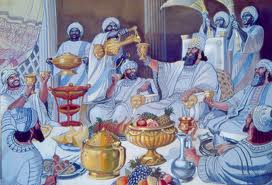
Final Ingathering
Like the Passover, the Feast of Tabernacles was commemorative. In memory of their pilgrim life in the wilderness the people were now to leave their houses and dwell in booths, or arbors, formed from the green branches "of goodly trees, branches of palm trees, and the boughs of thick trees, and willows of the brook." Leviticus 23:40, 42, 43.
The first day was a holy convocation, and to the seven days of the feast an eighth day was added, which was observed in like manner.
At these yearly assemblies the hearts of old and young would be encouraged in the service of God, while the association of the people from the different quarters of the land would strengthen the ties that bound them to God and to one another. Well would it be for the people of God at the present time to have a Feast of Tabernacles--a joyous commemoration of the blessings of God to them. As the children of Israel celebrated the deliverance that God had wrought for their fathers, and His miraculous preservation of them during their journeyings from Egypt, so should we gratefully call to mind the various ways He has devised for bringing us out from the world, and from the darkness of error, into the precious light of His grace and truth.
With those who lived at a distance from the tabernacle, more than a month of every year must have been occupied in attendance upon the annual feasts. This example of devotion to God should emphasize the importance of religious worship and the necessity of subordinating our selfish, worldly interests to those that are spiritual and eternal. We sustain a loss when we neglect the privilege of associating together to strengthen and encourage one another in the service of God. The truths of His word lose their vividness and importance in our minds. Our hearts cease to be enlightened and aroused by the sanctifying influence, and we decline in spirituality. In our intercourse as Christians we lose much by lack of sympathy with one another. He who shuts himself up to himself is not filling the position that God designed he should. We are all children of one Father, dependent upon one another for happiness. The claims of God and of humanity are upon us. It is the proper cultivation of the social elements of our nature that brings us into sympathy with our brethren and affords us happiness in our efforts to bless others.
The Feast of Tabernacles was not only commemorative but typical. It not only pointed back to the wilderness sojourn, but, as the feast of harvest, it celebrated the ingathering of the fruits of the earth, and pointed forward to the great day of final ingathering, when the Lord of the harvest shall send forth His reapers to gather the tares together in bundles for the fire, and to gather the wheat into His garner. At that time the wicked will all be destroyed. They will become "as though they had not been." Obadiah 16. And every voice in the whole universe will unite in joyful praise to God. Says the revelator, "Every creature which is in heaven, and on the earth, and under the earth, and such as are in the sea, and all that are in them, heard I saying, Blessing, and honor, and glory, and power, be unto Him that sitteth upon the throne, and unto the Lamb forever and ever." Revelation 5:13.
The people of Israel praised God at the Feast of Tabernacles, as they called to mind His mercy in their deliverance from the bondage of Egypt and His tender care for them during their pilgrim life in the wilderness. They rejoiced also in the consciousness of pardon and acceptance, through the service of the day of atonement, just ended. But when the ransomed of the Lord shall have been safely gathered into the heavenly Canaan, forever delivered from the bondage of the curse, under which "the whole creation groaneth and travaileth in pain together until now" (Romans 8:22), they will rejoice with joy unspeakable and full of glory. Christ's great work of atonement for men will then have been completed, and their sins will have been forever blotted out.
PP 540-542